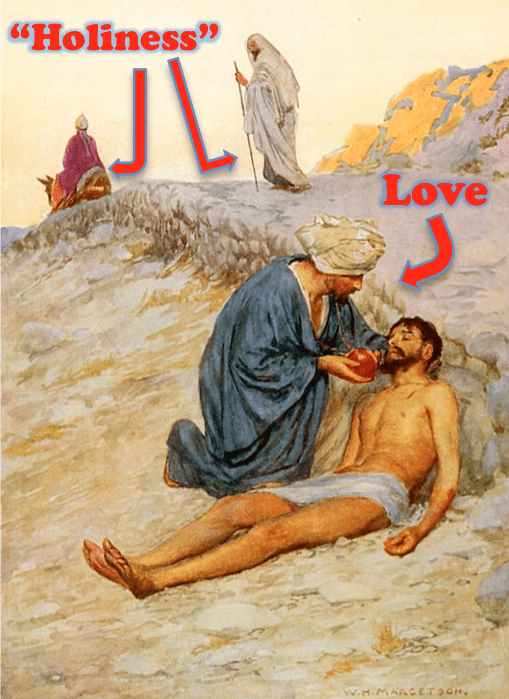And I will show you a still more excellent way.
If I speak in the tongues of mortals and of angels, but do not have love, I am a noisy gong or a clanging cymbal. And if I have prophetic powers, and understand all mysteries and all knowledge, and if I have all faith, so as to remove mountains, but do not have love, I am nothing. If I give away all my possessions, and if I hand over my body so that I may boast, but do not have love, I gain nothing.
Love is patient; love is kind; love is not envious or boastful or arrogant or rude. It does not insist on its own way; it is not irritable or resentful; it does not rejoice in wrongdoing, but rejoices in the truth. It bears all things, believes all things, hopes all things, endures all things.
Love never ends. But as for prophecies, they will come to an end; as for tongues, they will cease; as for knowledge, it will come to an end. For we know only in part, and we prophesy only in part; but when the complete comes, the partial will come to an end. When I was a child, I spoke like a child, I thought like a child, I reasoned like a child; when I became an adult, I put an end to childish ways. For now we see in a mirror, dimly,but then we will see face to face. Now I know only in part; then I will know fully, even as I have been fully known. And now faith, hope, and love abide, these three; and the greatest of these is love.
Love or else nothing. Everything else without love amounts to nothing. There is no good apart from love, no goodness apart from love — no virtue, no purity, no obedience, no righteousness, no piety, no faith, no devotion without love.
There is no such thing as holiness without love. There is no such thing as holiness distinct from or separate from love. That which is distinct or separate from love is nothing — worthless, noise and clamor.
And there can be absolutely no such thing as holiness in opposition to love. That which is opposed to love is worse than nothing. It is unholy.
I am elliptically grateful to Scot McKnight for helping to clarify what I find so bewildering in some of my fellow Christians. It is this notion that God’s love must be “balanced” somehow against God’s holiness. Holiness is thus perpetually invoked as a “yes, but …” qualifier, setting a boundary on love — on God’s love and our own. Holiness, we are constantly being told, sets limits on love.
 Here is the comment from McKnight that clarified this for me: “Part of the tension in the kerfuffle is created by which foot one puts over the line first: the holiness foot or the love foot.”
Here is the comment from McKnight that clarified this for me: “Part of the tension in the kerfuffle is created by which foot one puts over the line first: the holiness foot or the love foot.”
What in the name of all that is holy is he talking about? What can this “holiness” possibly mean if it is something other than love — something apparently opposite love? God’s “holiness,” he suggests, is something we should regard as on equal and opposite footing with God’s love.
I cannot conceive of what such “holiness” means. Jesus, Paul, Isaiah and Amos are no help — they all insisted that no such thing can or does exist. For all of them, the idea of some “holiness” that was separate or distinct from love was meaningless. Nothing.
What puzzles me most here, though, is why anyone would want to suggest such a thing. Why would anyone ever think it was helpful or virtuous or good to create some loveless notion of holiness and then try to place it on equal footing with love?
Have you ever had that impulse? Have you ever one day thought to yourself, “Hey, you know what’d be great? Let’s come up with some concept of virtue and goodness that’s wholly separate from love! Let’s prove Jesus and Paul and the prophets wrong and theorize some abstract notion of ‘holiness’ — some concept of a law that love does not fulfill.”
Why would anyone want that? Why would anyone think God wanted that? It’s just kind of … well, weird.
What, pray tell, is the content and substance of this loveless holiness? What are these other laws that Jesus and Paul forgot about when they both told us that love is the fulfillment of the law? Is it some kind of dietary restriction? Should we be eschewing hot caffeinated beverages? Should we refrain from wearing red on Wednesdays? What could holiness without love possibly even mean?
Or is this just a sex thing? That’d be ironic, you know, if it turned out that the very folks who make the biggest deal about sex and holiness turned out to be the ones insisting on the separation and opposition of sex and love.
If holiness means anything worth anything at all, then it can only be as an expression of love. Any definition of holiness that is not an expression of love is, at best, arbitrary and absurdist. But more likely it’s just opposed to love. That’s how this absurd abstraction of holiness is always cited and invoked by its adherents — as something opposed to love, something to be weighed in the balance across from love and against love and instead of love.
There’s a word for that which is opposed to love, against love and instead of love. That word is not “holiness.” Not even close.
There is no such thing as holiness without love.
There is no such thing as holiness without love.
There is no such thing as holiness without love.
OK, then.












